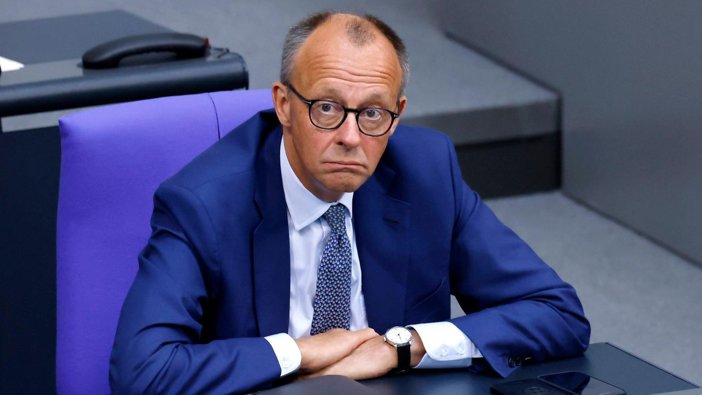
Germany’s Merz Faces Backlash Over Migration Remarks
Chancellor Merz insists irregular migrants are “a problem in the cityscape” as Germany grapples with labour shortages and rising polarization.
German Chancellor Friedrich Merz has sought to clarify his recent remarks on migration that sparked widespread controversy across the political spectrum and civil society. During a visit to London, Merz stated that while Germany must continue to welcome immigration for its labour market, he believes that migrants without legal residence status who fail to comply with national laws are creating visible problems in public spaces.
Why Has This Issue Become So Controversial?
What exactly did Merz say? On the sidelines of the Western Balkans Summit in London, Chancellor Merz emphasised that immigration remains essential for Germany’s economy, especially its labour market. “We can no longer do without them,” he remarked, referring to people with migration backgrounds, “regardless of where they come from, their skin colour, or whether they are first, second, third or fourth generation residents.”
Yet at the same time, Merz stated that there was still a “problem in our cityscape” which he attributed to irregular migrants — those without residence rights, without employment, and not adhering to laws. He mentioned that this issue appeared in train stations, subways, certain parks and entire districts — areas where police were facing “great problems.”
Why has the phrase “cityscape problem” triggered the backlash? The critique hinges on the suggestion that groups of people (in this case, irregular migrants) are visually identifiable and implicitly linked to disorder — a trope present in far-right rhetoric. When pressed to clarify, Merz responded, “Ask your daughters,” a phrase critics highlighted as insensitive and delegitimising.
What Are the Reactions — and Why Do They Matter?
Civil Society & Petition Response
More than 120,000 people signed a petition titled “We Are the Daughters” within 24 hours, rejecting what they described as racialised, fear-based framing. Petition organisers asserted that the real problem of violence is domestic, not linked to migrants “in the cityscape”, and they demanded that the government take femicide seriously and treat protection from domestic violence as a top priority.
Thousands also demonstrated outside the CDU party headquarters in Berlin under the same slogan, with further protests planned in Kiel and Cologne.
Economic and Social Institution Critique
The head of the Deutsches Institut für Wirtschaftsforschung (DIW) (German Institute for Economic Research), Marcel Fratzscher, said Merz’s statements “deepen social polarisation and inflict considerable economic damage.” He warned that the message undermines Germany’s welcoming culture and will worsen the country’s already acute skilled-labour shortage.
Meanwhile, the head of the Diakonie, Rüdiger Schuch, emphasised that migrants have long been a “natural part of our cityscapes” — as entrepreneurs, colleagues, football teammates and neighbours. He urged that problems must be addressed through factual policy and mutual respect, not rhetoric.
Political Dimension
Within his own coalition, Merz has also faced headwinds. The Sozialdemokratische Partei Deutschlands (SPD) distanced itself. Vice-Chancellor Lars Klingbeil warned that policy must avoid dividing society into “us” versus “them.” He said he wants to live in a country where one’s appearance does not determine whether one “fits into the cityscape.”
On the other hand, within the centre-right bloc, some backed Merz’s tone, while others called for clearer definition. For example, former CDU candidate Armin Laschet described Merz’s phrasing as “too nebulous.” By contrast, CDU parliamentary leader Jens Spahn defended the Chancellor: he argued that Merz had simply described what “everyone sees walking through Duisburg or many mid-sized German cities” — neglect, drug-dealing, young men often with migration backgrounds from eastern Europe or Arab-Muslim countries — which he linked to irregular migration.
CSU-politician Marcus König (Mayor of Nuremberg) offered that the debate is not about people who have lived in Germany for years; rather it is about those whom the state has sought to deport for years due to criminal behaviour or loss of residence status.
What Are the Broader Policy and Social Implications?
Labour Market and Demography
Germany is contending with one of the EU’s most significant labour-shortages — especially in engineering, health and construction sectors. While immigration is widely seen as part of the solution, the message that some migrants are creating “problems” may serve as a deterrent to skilled workers considering Germany as a destination.
Social Cohesion and Integration
Merz’s remarks come at a time when questions of integration, housing pressure, refugee flows and asylum-system stress are at the forefront of public discourse. A narrative that frames migrants as potential trouble-makers in the “cityscape” risks hindering integration efforts, heightening community tensions and making it harder to build inclusive public spaces.
Political Strategy and Far-Right Context
Analysts note that Merz’s tone aligns with a trend among conservative parties across Europe becoming tougher on migration in response to far-right competition. Whether this strategy succeeds or back-fires will depend on how well the government can balance migration control with economic needs and inclusive messaging.
Narrative Risk: Who is Included? Who is Excluded?
Merz is caught between two imperatives — the economic need for immigration and the political need to appear tough on irregular migration. The challenge lies in how to make that distinction without inadvertently sending the message that all visible migrants are suspect, thereby undermining trust, inclusion and the country’s attractiveness as a destination.
Does Merz reject all immigration?
No. He explicitly affirmed that immigration remains necessary for Germany’s labour market and stated that individuals with migration backgrounds are already “an indispensable part” of the workforce, regardless of generation.
Who is Merz targeting when he speaks of “problems in the cityscape”?
He clarified that his concern is those with no legal residence status, no job, and who are not abiding by Germany’s laws. He referred to certain urban areas where law-enforcement faces challenges.
Why do opponents call his remarks “divisive”?
Because the phrase “cityscape problem” and the suggestion that daughters should be asked seem to echo far-right narratives that portray migrants as a threat to women and public order, thereby racing and othering immigrant communities.
What are the economic concerns raised by critics?
Institutions like DIW argue that the rhetoric undermines Germany’s welcoming culture for skilled workers and may worsen labour shortages — a key economic risk for a country with an aging population and shrinking workforce.
How should Germany proceed with migration policy?
Experts suggest that Germany must develop policies that support legal labour-migration pathways, integration programmes, and enforcement of laws for irregular migration — but frame the narrative in a way that emphasises inclusion, respect and shared contribution rather than creating social divides.
What Happens Next?
The CDU leadership has indicated that Merz may present a more detailed policy outline on migration and integration in the coming weeks, possibly during the next Bundestag session. Meanwhile, opposition parties are likely to keep the issue alive, framing the Chancellor’s remarks as part of a broader struggle over national identity, economic necessity and social cohesion.
As Germany continues to navigate the demographic challenge of an aging population, labour-scarce industries, and the social complexity of immigration, Merz’s test will be whether his rhetoric can align with inclusive messaging and effective policy — or whether it will deepen divisions and weaken the country’s attractiveness as a destination for talent.
Sources: Reuters The Guardian EU Observer






